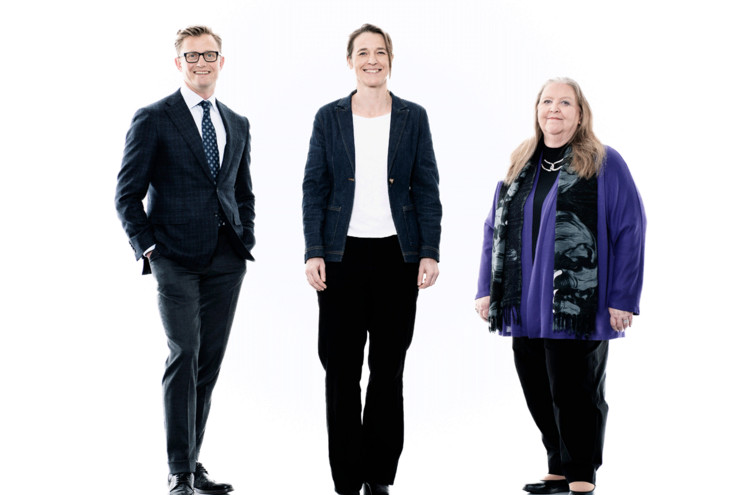DKK 100 million for new research and knowledge dissemination project

How can we as a society and as humans learn to embrace algorithms and artificial intelligence?
Algorithms are controlling an ever-increasing part of society and our daily lives. But what are they actually doing for us – and to us? Can we trust an algorithm? We might feel confident about their accuracy, but not necessarily about their morality or impartiality. Recommendations and decisions based on large amounts of data and algorithms seem objective and convincing. But what do we know about the way in which the algorithms actually arrive at their results?
What happens when algorithms are used in sensitive areas to make actual predictions? For example which children are at risk of being subjected to abuse, or which debtors are unlikely to pay their debts. Should we use algorithmic predictions as a basis for political decisions, because they are perhaps more reliable than a human gut feeling? If so, what will the consequences be for democracy? And what are the consequences if we allow algorithms to make decisions in routine matters being handled by local authorities or the courts?
“In 2021, both foundations will celebrate their anniversary. We will mark this by making a joint grant to the ADD project, among other things. The humanities and social sciences research which are main grant areas of VELUX FONDEN can make a decisive contribution to various solutions. However, it is important for us that the research is linked to a strong communication effort. This is to ensure the broad involvement of both the population and important stakeholders in the work of creating sustainable, democratic solutions - in line with the foundation's overall purpose of strengthening the Danish democratic society.”
Hans Kann Rasmussen,
Chair of VELUX FONDEN
An ambitious DKK 100 million combined research and knowledge dissemination project will now analyse, produce insights and foster discussion about all this and much more. The project has been named ‘Algorithms, Data and Democracy’ – the ADD project.
Digitalisation has become a byword for growth and prosperity in society, but it has also become a controversial and contributing cause of crises of confidence in society. The pace of technological development is accelerating trends in society towards populism, polarisation, conspiracies, conflicts and increased inequality. This is entwining environmental, social, political and economic crises and fostering general distrust in society’s traditional institutions.
The ADD project will provide insights into and explain these connections at the same time as developing both technological and societal solutions aimed at restoring faith in public institutions.
“The democratic challenges of digitalisation have both social and technical dimensions. Therefore, it became clear to us early on that solutions had to be found in an interdisciplinary collaboration between the humanities and computer science - and between VELUX FONDEN and VILLUM FONDEN. It is our vision that in 10 years' time, the ADD project will contribute to Denmark being a pioneer – both in relation to the population's digital insight and in relation to how democratic values are supported when it comes to algorithms and data used in society's institutions and in decision making.”
Jens Kann-Rasmussen,
Chair of VILLUM FONDEN
As part of their anniversary activities in 2021, VILLUM FONDEN and VELUX FONDEN have decided to grant DKK 100 million to this unique project. Over the next 10 years, the research and knowledge dissemination project will provide valuable know-how on the use of algorithms, and how we can use algorithms sensibly in our society and in our democracy in future. In other words: How we can prevent algorithms from contributing to greater conflict, insecurity and mistrust. And how they can make a positive difference and be of practical value to humans.
Following an open call and a recommendation from an international jury, the research part of the project has been won by a research consortium headed by Professor Sine Nørholm Just from the Department of Communication and Arts at Roskilde University.
It is not just the project itself that is unusual, but also the make-up of the research consortium. In addition to Sine Nørholm Just, the project will be run together with five researchers from five other Danish universities: Christina Lioma, professor at the Department of Computer Science, University of Copenhagen, Torben Elgaard Jensen, professor at the Department of Culture and Learning, Aalborg University, Leonard Seabrooke, professor at the Department of Organisation, Copenhagen Business School, Helene Friis Ratner, associate professor at the Danish School of Education, Aarhus University, and Alf Rehn, professor at the Department of Technology and Innovation, University of Southern Denmark.
“The aim of the project is to bring together computer science, the social sciences and the humanities to develop new solutions for the benefit of citizens and society. In other words, we want to understand technological developments and strengthen their democratic potential,” says Sine Nørholm Just.
The research group will analyse dilemmas and identify solutions through selected cases within areas such as health, finance, public administration, public opinion and decision-making. The project will present specific ideas for technological innovation and proposals for general guidelines and policies.
The project’s knowledge dissemination and dialogue work will be led by editor-in-chief Lisbeth Knudsen from the Copenhagen-based think-tank and magazine Mandag Morgen. The ambition is to create a large alliance of civic stakeholders who are all involved in public information, digital education, digital learning and knowledge sharing about new technologies at different levels. These are all important forces in civil society, the public sector and the private sector, which can contribute to ensuring broad and public participation in and knowledge about how algorithms and digitalisation affect our lives and society.
“If we don’t feel comfortable with the new technologies, then we won’t trust them, and the public information alliance must help to disseminate knowledge and build up a level of trust, while the researchers in the other part of the project develop solutions to how we can work with transparency and new guidelines for the application and design of new technology,” says Lisbeth Knudsen.
The knowledge dissemination and dialogue part of the project will also see the establishment of several political laboratories. The idea is that different stakeholders in Danish society ranging from representatives of the business community to managers in the public sector, various interest groups and politicians can inspire one another and provide the researchers with concrete issues. The researchers will then be able to test their theses and research results along the way in these political laboratories.
Professor David Budtz Pedersen from Aalborg University has been appointed as the knowledge broker, and will help to ensure integration between the research and knowledge dissemination project. He will also be able to head independent research tasks within the overall project framework. The goal is to support the project as a whole with data and evidence-based methods that can be used in policy development and communication.
On the importance of the ADD project, he says: “It is crucial for the development of democracy that interdisciplinary research results within algorithms, data, ethics, legislation, psychology and media are translated and applied in society in the coming years.”
